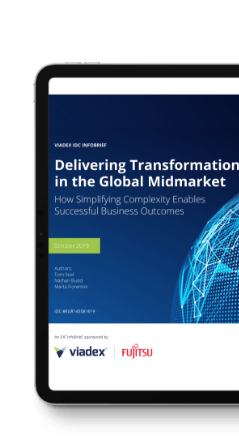2000 things any mid-market business needs to know about global growth

by
Brian Dunleavy, Commercial Director, Viadex
New frontiers
The desire to grow, expand, explore and extend the boundaries of what we do is one of mankind’s fundamental driving forces. This is why Romans walked out on the glorious Italian climate and great ice cream to take over great swathes of far less climatically-blessed countries.
Who would really want to leave Rome to live in Colchester, or the Ukraine, or even Austria? Why did Vikings row so far with not too much idea of where they’d end up? Did you know that Kansas was once a Spanish colony? Many of these conquerors didn’t even know what they’d find when they got where they were going, and sometimes didn’t even know where that was.
Need to know basis
It’s a bit easier today to find your way around the world, but still not without it’s challenges. Technology enables businesses to treat the world as one market, but it isn’t sufficient to have one global website and assume it will fulfil its purpose in every territory you want to target.
There is no substitute for on-the-ground representation. The closer you are to your markets as a geo-dispersed business, the more you’ll understand not just your customers and what they want, but also the complexities of multiple legal codes, tax laws, trading rules, restrictions, limitations, regulations and, somewhere at the top of the list, potential frustrations.
I’d love to just rattle off the two thousand things any globally expanding mid-market business should know, but you might lose the will to live if you started reading them. Not that I know them all myself, but I do work with a team and a global network of on-the-ground specialists who collectively know probably far more than two thousand essential things. Everything that everyone needs to know is known by someone somewhere, it’s just not entirely easy to find who that is, when you need to know.
A world full of challenges
To succeed globally, a business needs to transcend adversity and simplify complexity. It’s easy enough to identify the challenges, but rarely so straightforward to overcome them. Consider global projects that require you to send infrastructure items to local datacentres. Outside of the obvious big-ticket territories and big-ticket equipment, even some of the world’s most renowned vendors either charge exorbitantly for the service or shunt the business out to a distributor or a large systems integrator.
Even here difficulties still persist in that many SIs are interested only in volume and not in one-off global projects or customers not looking to spend huge amounts. Dino Cooper, CEO of Viadex, offers some interesting insights on the problem of global IT logistics and supply in his interview with CRN.
Technology is designed to make things simpler but getting the right technology to the right place can be a convoluted process. The Romans had the right idea. “All roads lead to Rome” is about having a unified approach to enabling your in-country locations to drive integration across your global organisation and to ensure consistency of approach wherever you have a base, supported by the most up-to-date technology.
Too often, however, the twists and turns and blockages along the journey can hold up progress, cause delays, incur more costs and, if you don’t get the right documentation to the right official body, can even lead to fines.
Choosing a partner you can depend on
Viadex strips out the complexity of all this. We have experience of all two thousand pitfalls (there are probably more) and can overcome each one as each global project requires. There is more though. I just wanted to add some pointers about the acceleration that can come to global expansion when you work with one partner with many capabilities.
This might seem like an ad for Viadex; it’s not meant to be that. I just wanted to allude briefly to our process of helping customers and, even if you have no interest in talking to Viadex about your global ambitions, then at least take these ideas into consideration when you seek advice from anybody else.
Viadex are not a mass-market reseller. We’re not about simply shifting product and making a fast turn on it. We are very much about committing to the businesses we work for, to offer multi-faceted services that take care of setting up globally-dispersed datacentres in the right way; delivering the kit required, on the best terms, with the smoothest passage through the export/import procedures and hurdles it might encounter along the way. We also offer the onsite and remote monitoring and support services to make sure everything works as it should and carries on delivering the performance expected of it.
Have meaningful conversations to reach better outcomes faster
Downtime, as we all know, can be damaging in the digital world. A moment’s lapse in continuity for the customer can mean a lost customer. Multiplied by thousands on the back of one unfortunate event and the effect can erode the bottom line and lead to multiple customer loss that becomes difficult to recoup. Business and technology should not be about chasing mistakes, but about seizing opportunities. It needs to be about continuous availability. It can only come about when customers and providers of services have meaningful conversations designed to open up as many options as feasible for the way ahead.
Before Viadex make any preliminary approach to a customer, we do our homework. We don’t formulate an idea and then go all out to sell it because we know that every customer, every market, and every country, is different.
Our research is about understanding if a potential customer could benefit from the service we offer, from sourcing and configuring the right solution – without our own objectives or vendor affiliations affecting the recommended solutions – through to global fulfilment and ongoing managed services to make sure your IT infrastructure delivers optimum performance globally.
If we feel a potential customer will be open to discussion, only then do we make contact. By the time we do, we have an informed view of your problems and a sound idea of the two thousand points of detail that we can address to solve them. We don’t waste anybody’s time; we optimise it.
If you feel there may be a fit between the problems you’re looking to resolve and the experience we can bring to bear in resolving them, please get in touch. Wherever you’re going, there’s a pretty good chance that we’ve been there before.





